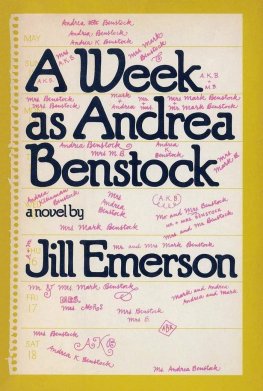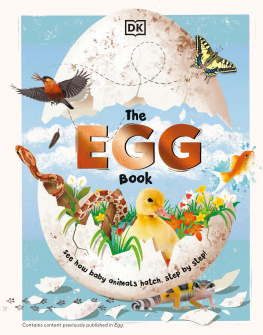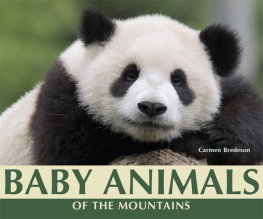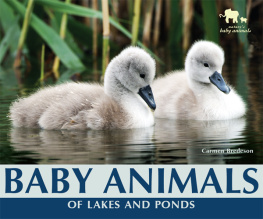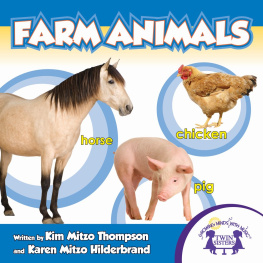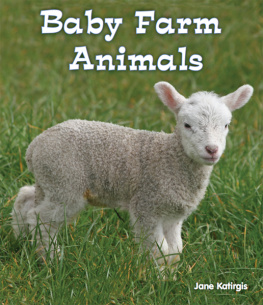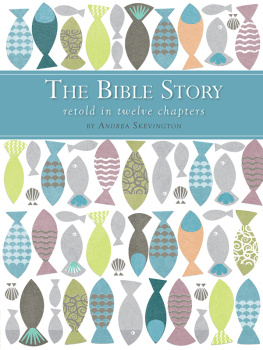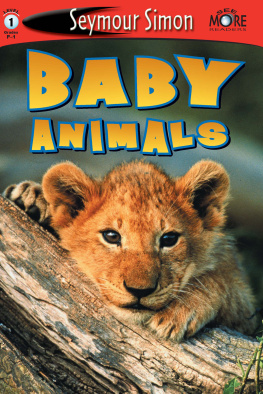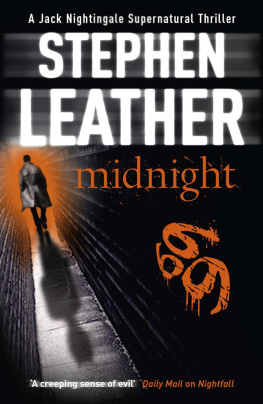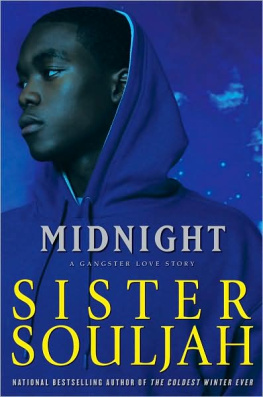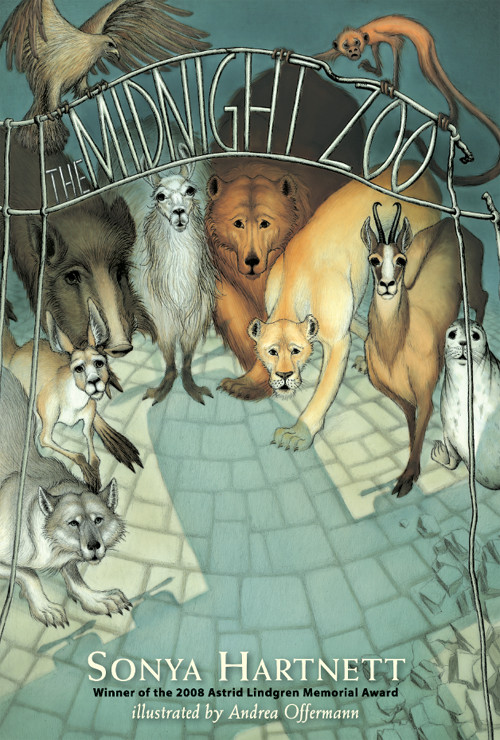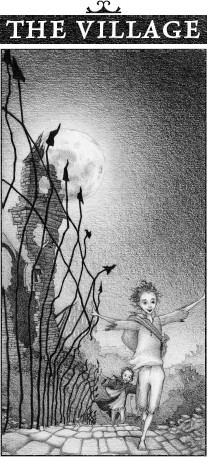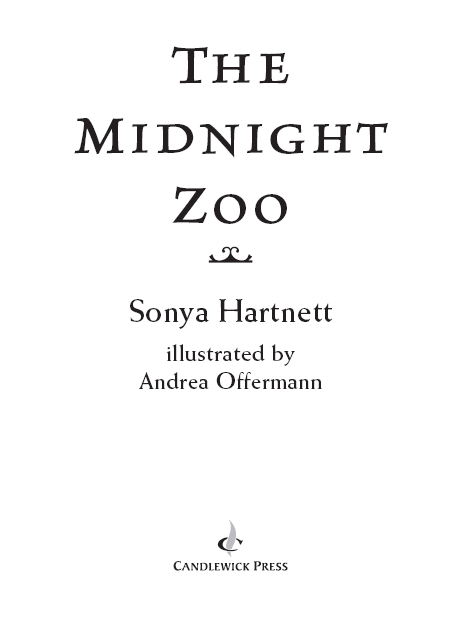
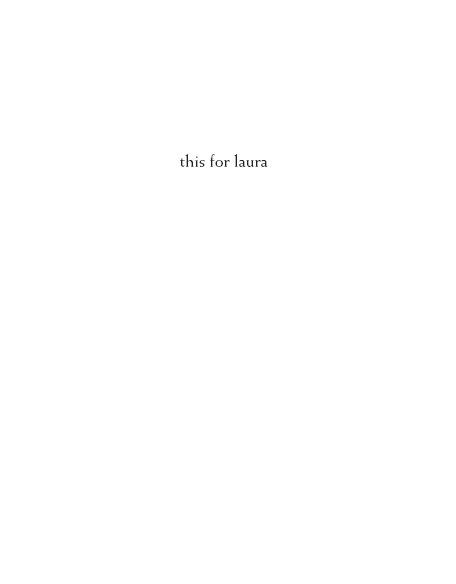
If the old bell had been hanging in the steeple it would have rung to announce midnight, twelve solemn iron klongs which would have woken the villagers from their sleep and startled any small creature new to the village and unaccustomed to the noise. But the bell had fallen from its height weeks ago, and now lay buried in silence beneath rubble; no small creature foraged in corners, because every scrap had already been carried away in beak and mouth and paw; and no woken villagers lay grumbling, for the people, like their bell, were gone. Their homes stood ruined, their beds broken into pieces, the bedroom walls slumped across the streets. Even the steeple, where the bell had hung for centuries, had had its pinnacle torn away, so the tower now stood against the sky like a blunt unfinished question.
In the clouds above the village, the legendary black-clad horseman who is Night noticed the silence and reined in his steed, which is also black as coal. Taking his vast and circular lantern, the moon, Night brushed aside a constellation of stars and came closer, curious to discover why no bell klonged, no creature paused, and no newborn baby, woken by midnights arrival, opened its pink mouth and wailed.
Along the cobbled streets of the hamlet, no tabby cat ran. No glass shone in the rows of shop fronts. Pots filled with geraniums had once sat beneath the streetlamps, making the village pretty; now the pots lay destroyed, and soil had spilled onto the road, and the lampposts, which had been stately, stood in the awkward angles of shipwreck masts, glass scattered at their feet. Chiseled stones which had once made houses for people and halls for officials and pillars for the market and, in the square, a pagoda to frame the town band, now lay about in ugly piles, clogging the streets and heaped against those walls that were still standing. Here and there, lazy fires burned, feeding on window frames and spilled fuel.
Bringing his great, whitely burning lantern close to the ground, Night saw a spider wandering across the stones, seeking, from amid the countless crannies, the best place to string a web; and when a cloud had passed and the light of the moon draped once more across the village, Night saw, to his surprise, two boys walking the ravaged streets. The children stepped carefully around the rubble, their footfalls making no noise, the taller walking ahead of the smaller and deciding their path. They were younger than Night had ever been, two scraps of life with scanty limbs clad in worn jackets and boots. Their eyes in their young faces were dark, like raven eyes, and their black hair was straggly, as unkempt as raven nests; they were clearly brothers, as kittens from the same litter are brothers and remain brothers for as long as they can. Both boys carried sacks on their backs, the older bearing the weightier load, the younger charged with the more delicate. As he picked his way through the debris the small boy dared to glance up occasionally and look around himself unhappily: Andrej, he said, but his brother ignored him and did not turn back, intent on navigating the shattered tiles and sagging awnings, the splintered timbers and toppled walls. Night watched the small boy struggle to contain himself, and fail: Andrej! he whispered, but still Andrej said nothing and took no notice. Something had rolled beneath his feet, tinking as it went, and he crouched to search the cobbles with cautious open palms. His fingers closed around a corkscrew: holding the find up to the white lamp of the moon, Andrej saw, silhouetted against the light, a sharp tip of iron, the snaky curves of the screw.
Tomas murmured, Andrej, for a third, stubborn time. Andrej sighed. He knew his brother was tired, that the bag he carried was heavy, and that the desolate streets would seem haunted to him. Andrej was twelve, but he had looked after Tomas all his life, and he thought of his nine-year-old brother as a child, but not of himself as one. He strove to understand Tomas the way his uncle, Marin, had understood the rugged ponies hed bought and trained and sold. A horse wants to please you, Uncle Marin had said, but it cant do so unless you tend its needs. Feed, rest, shelter, and courage! Courage was important: Uncle Marin said, Horses arent fools. They like a quiet life. But if bravery is asked of them, they can be brave as gods. All it takes is someone courageous to show them what courage looks like. If you want a horse to put its faith in you, you must convince it you are fearless Andrej the hero! even if your courage is only make-believe. So although fear beat inside Andrej like a dark, angry bird, although every corner might conceal a soldier watching and waiting for children like them, although Marin was gone and the boys were almost alone, Andrej tried always to appear calm and undaunted for Tomas, as if the precarious life they lived was unexceptional, and held no terrors at all. He tucked the corkscrew away and said, Come on. Its all right. Well stop soon.
Tomas wiped his eyes with a fist and shambled after his brother. The weeks hed spent hiding in forests and sleeping in barns and wandering windswept roads had smudged dirt into his skin and dusted the color from his clothes; probably he was hardly more visible than a shadow, but Tomas felt as brightly lit as a shrine. Andrej was right: Tomas did think the crushed village was haunted. No dog barked, no clock ticked, no tap dripped, no baby yowled, no hands clapped to chase him away from doors through which the fragrance of fresh bread was borne: but in the silence that lay like a cold sheet across the streets, Tomas heard the breathing of ghosts. Ghostly footsteps seemed to follow him, stopping at the exact moment he paused. Ghostly eyes seemed to watch him, and behind these eyes were thoughts about Tomas, about his littleness and helplessness, about what should happen to him. In their weeks of roaming, he and Andrej had passed through many towns, some friendly, some standoffish, some damaged, some untouched but none that were eerie, as this one was. None that were so punished and abandoned and gray. In another town he would have stopped to warm his backside by one of the low-burning fires, but here even the flames seemed hostile, like jeering poking tongues. Hoisting the pack on his shoulders, Tomas hurried to catch up with his brother. Andrej, he said, Im not tired. We dont need to stop.
Moonlight lay on Andrej like a fairys suit of armor. His gaze ducked away from the wreckage to give his brother a distracted smile. Dont be frightened.
Im not frightened
Well find a safe place down the road, where you can sleep.
And what will you do? Tomas asked it, although he knew. While Tomas slept, Andrej would return to explore the town, scouring the creaky debris for anything worth keeping. Hed climb walls and crawl into crevices, opening cupboards and upending boxes, and when Tomas woke, it would be to treasure. Once, hed opened his eyes to a cascade of silver coins tumbling from a bead purse. Once, hed woken to six cinnamon buns and a jar of tangy pickles; another time, to three shiny bottles of tingling apple cider. Or the treasure might be a gentlemans hat or a stuffed waterbird or a set of lead animals or a necklace made of shells, something Tomas could play with and tell stories about and even keep forever, if it wasnt too big or heavy. Tomas hugely admired his brothers courage, which brought home such bounty but he hated it, too. Having courage, Tomas had learned, didnt mean things would turn out well, and that you would be all right. Sometimes, Tomas knew, being courageous was the least safe thing in the world.


